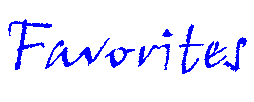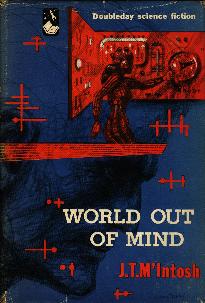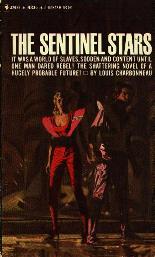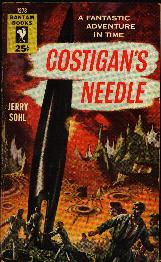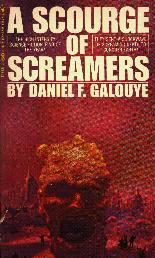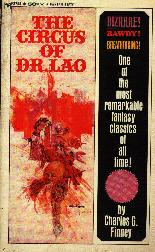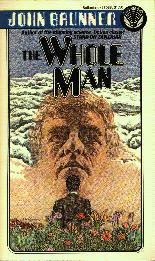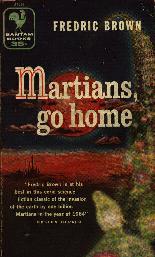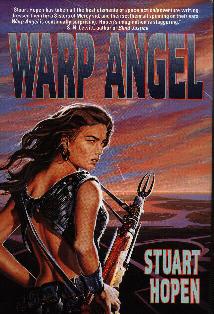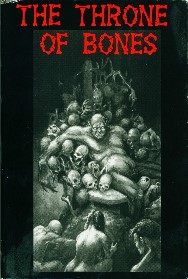Herein, Gentle Reader, you will find a collection of short pieces about my favorite SF books. I wrote most of these as fillers for a fanzine long ago, but I've occasionally added new ones. In all of them I recommend works by authors other than myself who I don't feel have gotten the attention they deserve.
You won't find the obvious recommendations of Tolkien and Heinlein here; these are all items I think have been unjustly neglected. I may add something about better-known favorites later, but for now what you have here are compilations of two series of very short articles on obscurities and lost treasures, plus whatever newer books I may have added.
In previous incarnations of this list I took it for granted that these were all out of print, but thanks to the wonders of print-on-demand publishing, several are back. I've provided links where I could -- just to Amazon, but you can probably find the books elsewhere if you try. Of course, these may be out of date, as books sometimes come and go quickly.
CONTENTS: Alphabetical by Author
- The Lani People, by J. F. Bone
- What Mad Universe, by Fredric Brown
- Martians, Go Home, by Fredric Brown
- The Whole Man, by John Brunner
- Star Rogue, by Lin Carter
- The Sentinel Stars, by Louis Charbonneau
- Engine Summer, by John Crowley
- The Circus of Dr. Lao, by Charles G. Finney
- A Scourge of Screamers, by Daniel F. Galouye
- Warp Angel, by Stuart Hopen
- Dying of the Light, by George R.R. Martin
- World Out of Mind, by J.T. McIntosh
- The Throne of Bones, by Brian McNaughton
- Costigan's Needle, by Jerry Sohl
Forgotten Classics
Everybody knows the great authors of SF's "Golden Age" -- Clarke, Asimov, Heinlein, Van Vogt, and so on. The greats of the thirties are still remembered almost as well -- E.E. Smith, Clifford Simak, Edmond Hamilton.
However, nobody seems to remember some of the authors who appeared in the sixties who I loved just as much as the greats when I was a kid -- authors like J.F. Bone, Daniel Galouye, Louis Charbonneau, and J.T. McIntosh. This forgetfulness may be in part because their work was usually published as paperback originals, especially by Bantam and Ace, and most of it has never been reprinted. In this series I point out some of my favorites, in hopes you can find them somewhere.
The Lani People, by J.F. Bone
First off, so far as I know J.F. Bone produced only one novel worth mentioning; I'm told he also wrote some short stories that saw print in Analog, and I know he wrote a novel or two for Laser Books during their brief disastrous existence, but as far as I'm concerned he's worth remembering for his first novel, The Lani People.
The Lani People probably sold pretty well, and some old-timers remember it, because of the lurid cover that depicted it as being a tale of perverse sexuality and slavery in outer space. In fact, the female lani are kept as pleasure objects, but that's by no means central to the story, which is about the nature of humanity. The lani are discovered on a distant planet in the far future; they look human, save that they have tails. A lani with her (male lani are too violent to be any use) tail removed is indistinguishable from human.
The law says, however, that the key is interfertility; anything that humans can breed with is human, and anything they can't breed with is just an animal. The lani, therefore, are animals, and the story follows the adventures of the young veterinarian hired to tend a lani herd as he gradually discovers the history and true nature of the species. It's got adventure, romance, excitement, and a dose of thought-provoking questions as well. Worth reading, definitely.
World Out of Mind, by J.T. McIntosh
I couldn't remember the title or the author, but for years I remembered the story. It was one of the very first novels I ever read; I think I was eight. It was the story of Eldin Raigmore, a man with no past, and his rise in a society where social status is completely dependent upon one's performance in a series of tests of intelligence, creativity, character, morality, etc. I looked for it half-heartedly for years -- half-heartedly because I was afraid it wouldn't be as good as I remembered.
I found it; it's World Out of Mind, by the much-maligned and underrated Scottish SF writer J.T. M'Intosh, published in the U.S. under the name J.T. McIntosh so as not to look so foreign. And if it's not quite the great epic I remembered, it's still a fine novel in the pulp tradition, with its stratified society of Browns, Purples, Reds, Yellows, and Whites, sub-graded as Circles, Crosses, and Stars, threatened by emotionless alien spies working from within. It's a shade naive by modern standards, perhaps, but a good read all around. It was a Science Fiction Book Club selection, and can be found in either paperback or book club edition in the used book stores.
Incidentally, I wasn't the only one who remembered the story but not the author or title; it's one of the most common story IDs requested on the rec.arts.sf.written newsgroup.
Does not appear to be currently available.
The Sentinel Stars, by Louis Charbonneau
I know now that The Sentinel Stars owes a lot to the classic dystopias of 1984 and Brave New World, but I read it before I read either of them, so I didn't care. It's an odd combination of the two; most of the world is a drab, oppressive 1984-style world state where citizens labor to whittle away their tax debts. However, there is hope, a goal they're working toward -- Freeman status. That's right, when one's debt is paid, one is free to live in one of the special freeman reservations, where nobody works, where there are endless entertainments -- and occasional bits of nastiness that the workers don't hear about, as it might harm the idyllic image, and where the real danger is terminal boredom.
TRH-247 is an ordinary citizen who finds himself tangled in the truth behind the idealized image of the freeman camps, involved in an illicit romance with ABC-331, and just generally running afoul of the entire system.
This was a 40-cent Bantam paperback, one of dozens they churned out in the sixties, but it's one that stands out in my memory as being a notch or two better than the rest.
Costigan's Needle, by Jerry Sohl
Costigan had invented a gadget that did something amazing; things that went through the "eye" of the needle-shaped device didn't come out the other side. At least, not in our world. They did come out somewhere, though.
The local religious fanatics considered this tampering with other worlds to be diabolical, and during the first critical testing of the first man-sized "needle" (prototypes had been little table-top models) one of them threw a monkey wrench in the works.
The resulting power surge put the entire population of a one-block radius around the needle into a harsh alternate reality where survival was difficult. Costigan's Needle is a "survival" novel in the tradition of Heinlein's Tunnel in the Sky (except I believe Needle is the older, actually) or Tom Godwin's Space Prison, where a bunch of people are thrown into a hostile environment and not all make it to the end of the novel. In Costigan's Needle there's the added twist that they know how to build a needle that might get them back -- if they can get their technology to a high enough level in time.
A Scourge of Screamers, by Daniel F. Galouye
Daniel Galouye's writing career was cut short in 1973, allegedly as a result of an argument with his publisher, Bantam; [the late] Mike Resnick can [could] tell you the gory details upon request (except that he keeps misremembering it as Ballantine, and I have Galouye's entire output, and it's all Bantam). Before he left the field, however, he produced a series of midlist novels that were pretty nifty. The best, in my opinion, was A Scourge of Screamers, in 1968.
For no known reason, people all over the world suddenly burst out screaming in anguish; is it a plague of some sort? Is it a new weapon? What is it?
It's the onset of zylphing, a result of rault previously obscured by the huge Saggitarian dust-clouds that block Earth's view of the galactic core, rault that's now getting through. It's a new means of perception. Why the screaming? Imagine if you had grown up in total, absolute darkness, having functional eyes but not knowing that you did, never seeing anything, having no concept of light or vision -- and then suddenly you're plunged into brilliant displays of light and color. You'd scream, too. It's a nifty idea done well.
Appears to still be out of print.
The Circus of Dr. Lao, by Charles G. Finney
I almost didn't include this fantasy classic in this series, because unlike the first five, just about everyone who has ever read this acknowledges it to be a classic. Even so, far too many people out there (and you know who you are) haven't read it.
Well, you should. It's been reprinted several times, either by itself or with other stories; I originally read it in an anthology edited by Ray Bradbury, but the copy now on my shelves treats it as a complete novel. It's an awkward length -- just under 50,000 words, where novels are generally considered 60,000 and up, and novellas are 20,000 to 45,000. That may have something to do with its not having gotten the attention it deserves.
If you've seen the movie version, The Seven Faces of Dr. Lao, don't think you know the story, because you don't, and it wouldn't matter if you did; it's one of the most literary fantasies ever produced, and needs to be read.
Written in 1935, in the depths of the Depression, it's the tale of the very strange circus that arrives mysteriously in Abalone, Arizona one day, a circus run by an odd little Chinaman named Dr. Lao and featuring attractions that are much more real than anyone can quite deal with -- when they realize just what the attractions are at all.
It's a story of mysteries -- most of them never explained -- and of how people deal with mysteries -- usually, by ignoring them. The whole thing is written in a cynical style that's at odds with what's being described, giving a peculiar result indeed, epitomized by the weird "Catalogue" at the end -- "An explanation of the obvious which must be read to be appreciated" -- which lists the characters, starting with the more or less human ones and working down to the foodstuffs, which also, as it happens, include a human or two.
This is really simply indescribable; the author drew on extensive travels in China and Mexico as well as experiences in the American Southwest, and seems to have managed to put everything he ever did or believed into this one story -- which virtually no writer ever manages. If you haven't read it, you should; there have been many editions over the years, both hardcover and paperback, so you should be able to find one.

These Are A Few of My Favorite Books
Okay, folks, I've written six short pieces on forgotten books that I remember fondly from my youth; but I haven't pointed out some of my not-so-forgotten favorites, books that I think everybody should read. Most of these are neither particularly obscure nor particularly famous -- they're just good. I'll say a few words about each, so you can pick the ones you think will match your own tastes.
The Whole Man, by John Brunner
Brunner became famous when he wrote Stand on Zanzibar, but he'd been working steadily in the field for years before that, and my very favorite of all his work is The Whole Man, the story of Gerry Howson, a lame, hunchbacked hemophiliac, one of the most miserable creatures on Earth, born and raised in a slum -- and the most powerful natural telepath who ever lived. Expanded from the story "Curative Telepath", The Whole Man is somewhat episodic, starting with Howson's birth, following through his formative years and his discovery of his talents, then describing a few cases handled in his career, a job that consists of pulling other telepaths out of fantasy worlds they've created, before winding up with a personal search for fulfillment and a happy ending reminiscent of Heinlein's Waldo -- only much more satisfying.
(And while you're reading Brunner, Stand on Zanzibar remains the best overpopulation novel I've ever read, and The Sheep Look Up, while almost unbearably downbeat and depressing, is the best ecological disaster novel I've ever read. Not to mention the superb fantasy, The Traveler in Black.)
Engine Summer, by John Crowley
Engine Summer is a long-after-the-holocaust novel that does about the best job I've ever encountered of putting the reader inside the head of a protagonist with a genuinely different way of thinking. Rush that Speaks is entirely human -- at least, throughout most of the novel -- but a member of a culture that bears little resemblance to our own, even though it's descended from modern-day California. Rush wants to be a saint, which in his society means a person whose life is transparent, so that through it, others may see their world and themselves. If that sounds too metaphysical or mystical, you may not like Engine Summer -- but you should give it a try, as the mysticism here is not the contrived occultism of most SF or fantasy novels with mystic elements, but an alternate worldview, a part of a different culture. Anyone interested in anthropology has got to read this.
Crowley went on to write other, better-known works, but this is still my favorite.
Reprinted both alone and in omnibus form, but not in print right now.
Dying of the Light, by George R.R. Martin
Yes, George R.R. Martin wrote lots of stuff before making it big with the Game of Thrones stuff.
Dying of the Light I think everyone will like -- except maybe for the ending, which even one of the editors hated. It's a story of culture shock, love, war, and action, with something for everyone. The hero has been summoned to the dying festival world of Worlorn by a message he believes comes from his former lover, now married to one of the men of High Kavalaan -- except that the lover won't tell him why he was summoned, and things grow ever more complicated as Dirk t'Larien gets further and further embroiled in the internal conflicts and culture of High Kavalaan and the other societies that set up the festival on Worlorn. This book has some of the all-time best chase scenes ever written, a well-thought-out alien culture or two, sex, romance, friendship, treachery, all that good stuff -- and an ending that infuriates people because it stops short a paragraph sooner than it seems it ought to, leaving it open for the reader to figure out the outcome of a duel.
Of course it's available -- it's George R.R. Martin.
Star Rogue, by Lin Carter
Here's another of my favorite books, believe it or not. Okay, if you ever heard of him, I know what you're saying -- "Lin Carter? Gimme a break! All he ever wrote was junk!"
That's mostly true. Most of his fiction was bad imitations of Edgar Rice Burroughs, Robert E. Howard, and others. A lot of it was sword-and-sorcery, a genre that's usually pretty bad anyway, and Lin Carter wrote some of the trashiest ever (though not as bad as Gardner Fox -- I've never understood how Fox could write so wonderfully for comic books and so very, very badly when he wrote novels).
However, think for a moment -- how can anyone write well when imitating Howard, or Burroughs, or Lovecraft, all of whom were basically second-rate writers? Sure, they wrote nifty stuff, but stylistically, most of their work was pretty weak.
And usually you see Carter imitating those things, so of course it sucks!
In Star Rogue, however, he was trying to imitate Heinlein, and Heinlein is not the sort of purple-prose paid-by-the-word Victorian hangover that Burroughs, Howard, and Lovecraft were. The result is actually quite tolerable.
The story involves an adventure of Saul Everest, Earth's only immortal man and the galaxy's top freelance secret agent, semi-retired. The star rogue of the title -- a gravitational anomaly cruising the galactic rim -- is simply something to get him into action, totally irrelevant to the plot and explained away in a single sentence near the end of the book. It's all sort of free-form space opera, with terraformed asteroids, telepathic aliens, psionic warfare, intelligent spaceships, galactic empires, attempted coups, and all sorts of fun stuff going on. It's a lot of fun. Not great literature, but really one of the best space operas I've read. Honest! From Lin Carter!
Makes you wonder how he'd have done if he didn't imitate anyone, doesn't it?
Star Rogue was a Lancer paperback original, never reprinted so far as I know, but it sold pretty well and turns up used a lot.
It's been reprinted, but is not in print right now.
What Mad Universe, by Fredric Brown
I just thought of something -- you have all read Fredric Brown's stuff, haven't you?
Specifically, I have in mind What Mad Universe and Martians, Go Home. Brown's specialty was humorous SF, usually gently mocking the cliches of the genre -- some of which are extinct now, but Brown's been dead for a quarter of a century or so, so you have to bear with him on that.
In What Mad Universe, the mild-mannered editor of a science fiction pulp is visiting the estate of his wealthy publisher in upstate New York, working on the letter column for the next issue -- specifically, trying to answer the latest LoC from Joe Doppleberg, an unbearably fannish space-opera lover -- when he's hit on the head by an unsuccessful unmanned moon rocket. The rocket carries an experimental device designed to make a flash on the lunar surface that would be visible from Earth; instead, it transports our hero into a parallel universe, a universe where Earth is in the middle of a war with Arcturus -- a universe just the way Joe Doppleberg would like it.
By the way, ignore the cover blurb saying it's "terrifying." It isn't even close.
Available as an ebook and in other formats.
Martians, Go Home, by Fredric Brown
More of Fredric Brown's fierce whimsy... in Martians, Go Home, Earth is invaded by ten zillion little green men from Mars, who can turn invisible, see through walls, teleport, and so forth, and who haven't come to take over -- just to make everybody's lives utterly miserable through petty harassment. What sort of harassment? Oh, well, for example there's the honeymoon couple who find a Martian sitting on the head of the bed demanding to watch their disgusting mating rituals.
Pure fun throughout, both of them.
Available as an audiobook, but not in print that I can find.

More Goodies
The dozen items above are all from fillers I wrote for fanzines, lo these many years ago; from here on, it's stuff written specifically for this website, but the basic theme is the same -- books I like that I feel don't get the attention they deserve.
In at least one case, a reader's reaction was to conclude that he can't trust my taste on anything, because I plug a book below he thought was a complete waste of time -- I did say "It may not be your cup of tea," though. I'm not claiming these are all great books with universal appeal, merely that they're books I like.
A listing here means that I thought the book was both something special, and somewhat obscure. I've also got some more ordinary recommendations:
Warp Angel, by Stuart Hopen
Okay, I admit to being biased -- I went to college with Stu Hopen. All the same, I don't hesitate to recommend Warp Angel. Norman Spinrad, who reviewed it in ASIMOV'S, agrees with me that Stuart is a "wild talent," insanely inventive and original. Warp Angel is jammed full of surreal, over-the-top imagery and bizarre set-piece scenes like nothing you have ever read before. It's not the most polished prose out there, nor the most straightforward plot, nor the most likeable characters -- Stu admits he may have read a few too many Russian novels -- but it's one of a scant handful of novels where every time I open it I find myself saying, "Damn, I wish I could come up with stuff like this!"
So what is it about? That's hard to describe. In a system of four inhabited planets, in a time after faster-than-light travel has been banned because it was destroying the fabric of spacetime, a young woman is out for revenge against the brutal society that destroyed her life -- but that doesn't really convey the right impression.
Take a look. It may not be your cup of tea -- but it's mine. So much so that I've published a new edition under my own imprint.
The Throne of Bones, by Brian McNaughton
Again, like Stu Hopen, the late Brian McNaughton was a friend of mine. In this case, though, I'm not just being biased -- The Throne of Bones is brilliant.
It's not a novel; rather, it's a short story collection where most of the stories interrelate to form a larger narrative. The closest equivalents I can think of off the top of my head are The King in Yellow, by Robert W. Chambers, and The Dying Earth, by Jack Vance.
Except The Throne of Bones is far darker and more complex than either of those. It's about ghouls. It's about death and despair and horror. It's elegant and mordant and mannered and brutal. It creates a world and an atmosphere like nothing else I've ever read.
If you aren't a horror fan you probably don't want to read it -- it'll give you nightmares. If you have a strong stomach, though, you owe it to yourself to check it out.
Articles copyright by Lawrence Watt Evans, various dates. All rights reserved.
Click here to return to  the top of the page.
the top of the page.



